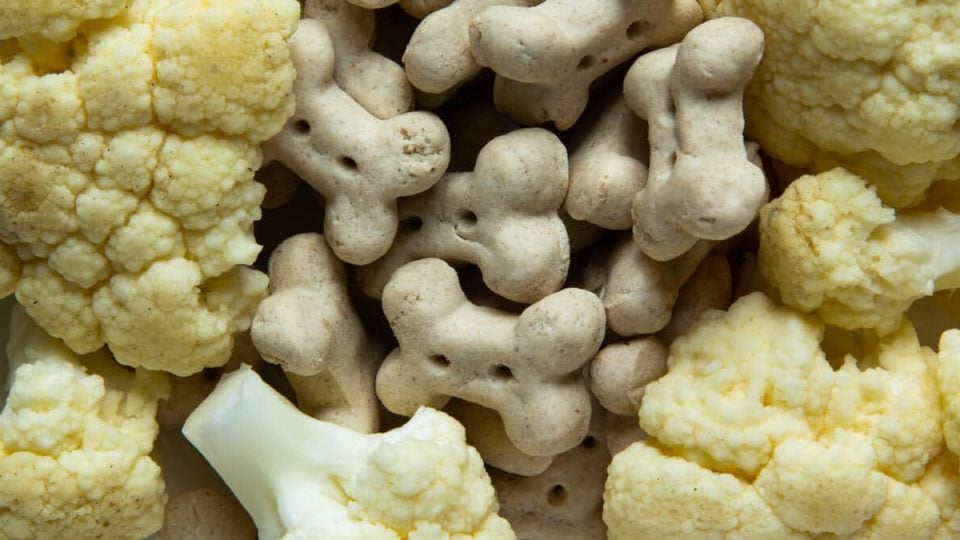Cauliflower is a nutritious vegetable many people enjoy raw, steamed, roasted, or riced, and you can also share this vegetable with your dog, experts say.
Dogs can eat cauliflower safely, and this vegetable may also provide some nutritional benefits, including vitamins and antioxidants.
That said, it’s important to only give your dog cauliflower in moderation. If your dog eats too much cauliflower, they could develop diarrhoea or other stomach discomfort.
If you’re a fan of this nutritious veggie, here’s everything you need to know about sharing it with your dog.
Is Cauliflower Nutritious For Dogs?
In moderate amounts, cauliflower can be a healthy addition to your dog’s diet, says Dr Iram Gladan, DVM and writer for Breed Atlas. “Cauliflower contains several good nutrients such as vitamins C and K, fibre, and antioxidants that boost the immune system, contribute to good bone health, and generally uplift wellbeing.”
“Vitamin C benefits the immune system and works as an antioxidant that helps protect cells from destruction,” explains Dr Gladan. “Vitamin K helps clot blood and excellent vascular health.”
Cauliflower also contains plenty of fibre, which can promote good digestive health and reduce incidences of diarrhoea and constipation. Fibre can also help your dog feel full, which may prevent begging and help them maintain a healthy weight. Plus, it’s a low-calorie snack, so it’s appropriate for dogs on a vet-approved weight loss diet.
Another health benefit of cauliflower is its antioxidants, which help reduce inflammation and potentially protect the body from chronic diseases and cancer. As a member of the cruciferous family, cauliflower contains glucosinolates, which help detoxify the liver.
Fresh cauliflower is also a hydrating snack, since it contains 92-94% water.
Is Eating Cauliflower Dangerous For Dogs?
For the most part, cauliflower is a safe treat for dogs. That said, it helps to keep a few important health risks in mind.
- Digestive problems. Since cauliflower is high in fibre, giving your dog too much could overburden their digestive tract and cause gas or diarrhoea.
- Choking hazard. Large pieces of raw cauliflower can pose a choking risk, especially for small dogs, puppies, or dogs who tend to swallow large chunks of food whole. Always cut this veggie into small, manageable pieces.
- Allergies. While rare, a cauliflower allergy is possible. Pay attention to any signs of a negative reaction when you give it to your dog for the first time. They might experience stomach distress or itchy skin, for example.
- Overfeeding. Dr Gladan says while cauliflower can be a nutritious snack, it should not replace your dog’s balanced diet. “A good diet for your dog must be varied to meet their nutritional needs,” she says.
How To Prepare Cauliflower For Dogs
When giving your dog cauliflower, or any other fruit or vegetable, it’s important to stick with small serving sizes. Generally, small dogs can have one to two florets per day, medium dogs can have two to three florets, and larger dogs can have up to four pieces.
You can feed your dog cauliflower raw or cooked. Cooking the cauliflower breaks down its fibrous content, so senior dogs, small dogs, and dogs with dental issues can eat it easily. Boiling or steaming also helps minimise potential bacteria or pesticides in the vegetable.
If you’d like to offer your dog a few pieces of raw cauliflower, you can reduce their risk of choking by cutting the florets into bite-sized pieces. Always wash cauliflower thoroughly to remove dirt and pesticide residue before serving.
Remember to serve cauliflower plain, without any butter or seasonings. Onions, garlic, and some herbs and spices can be toxic to your dog.
Finally, Dr Gladan advises pet parents to offer cauliflower in moderation. Make sure cauliflower, like any other treats, make up less than 10% of your dog’s daily calorie intake.
Other Dog-Safe Fruits And Vegetables
Dogs are omnivores, and like humans, they can benefit from eating a range of fruits and vegetables. This can give them a boost of essential vitamins and fibre without unnecessary fat and sugar.
Cauliflower isn’t the only vegetable you can feed your dog. Other fruits and vegetables you can give dogs include:
- Carrots. Many dogs love the taste and crunch of carrots, which provide beta-carotene, potassium, and vitamins C and B6.
- Green beans. These contain fibre, omega-3 fatty acids, calcium, folic acid, and iron, along with vitamins A, C, and K.
- Beets: These can boost your pup’s immune system and aid digestion with fibre, vitamin C, folate, manganese, and potassium
- Sweet potatoes. These are high in fibre and contain vitamins C and B6.
- Raspberries. These berries contain fibre, vitamins, and antioxidants.
- Spinach. This leafy green is rich in calcium, iron, and fibre, along with vitamins A, B, C, and K. Spinach promotes heart health, may help lower cancer risk, boosts energy levels, and supports the immune system.
- Peas. These contain B vitamins, zinc, and fibre, which can help support your dog’s heart health, vision, muscles, metabolism, and brain.
Just check with your vet before offering your dog any new foods, and pay attention for signs of an unwanted reaction, like stomach distress or itchy skin.




